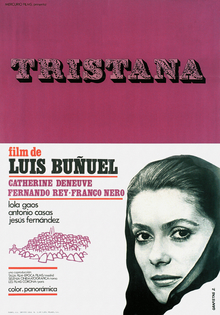After her mother’s death, Tristana (Catherine Deneuve) in 1970’s Tristana, becomes the ward of a much older man, Don Lope (Fernando Rey). Innocent because of her youth, Tristana is eventually propositioned by Don Lope, agreeing to go to bed with him. Hereafter she hates the man for his sexual proclivity and decides to take up with a young painter (Franco Neri), living with him for two years. Subsequently Tristana develops a tumor and has to have her leg amputated—and is again in the care of her guardian. Now, however, the woman is plainly bitter and cruel.
On the one hand, in this Luis Bunuel film, there is Don Lupe’s humane, religion-rejecting 1920s leftism (approved by Bunuel?); and on the other, Don Lope’s imperious attitude and unwise behavior because of sex. In light of this and Tristana’s corruption, the opus must be considered basically misanthropic. The themes here, however, have already been explored in Bunuel’s Viridiana, a film with more verve than Tristana. Why did Bunuel want to make the picture?
Deneuve’s part is dubbed in Spanish by another speaker (the film is set in Spain). A beautiful Spanish actress would have been preferable to a beautiful French one.



